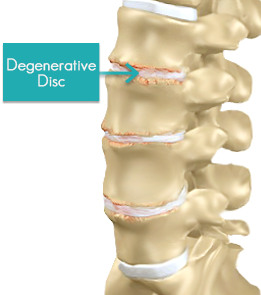What is Degenerative Disc Disease?

Degenerative disc disease is symptoms of back or neck pain caused by wear and tear of the spinal discs. In fact, the condition is one of the most common causes of lower back and neck pain. Nonetheless, it tends to be the most misunderstood.
It’s common for degenerative disc disease to cause a low level of chronic pain. However, it typically includes intermittent spats of severe pain. On the other hand, some cause weakness, numbness, and warm, shooting pains in the arms and legs. This shooting pain is called radicular pain (sciatica.)
There are two areas of the spine that disc degeneration typically occurs, the neck and lower back. When your spine endures the most stress, it is most susceptible to disc degeneration.
Symptoms & Signs of The Disease:
Degenerative disc disease most commonly occurs in the neck and lower back. Since these areas go through the most motion, they are more susceptible to wear and tear.
The most common symptom of degenerative disc disease is low-grade pain near the infected site. However, in more severe cases, the discomfort can be disabling. Flare-ups can happen suddenly or be related to recent activity. It’s typical for a pain flare-up to last anywhere from three days to several weeks. Then, pain levels normalize or go away completely.
Additional symptoms of degenerative disc disease include:
- Increased pain from lifting or activities
- Spinal instability; making your back feel unsupported
- Muscle spasms or muscle tensions
- Sharp, stabbing, hot radiating pain
- Increased pain when sitting or standing for extended periods
- Decreased pain from changing positions or in certain positions
Causes of Degenerative Disc Pain:
Just because you have a degenerating spine does not necessarily mean you will have pain. As a matter of fact, the discomfort usually only occurs when the degenerative disc affects additional structures in the spine. These structures typically include:
- Muscles
- Joint
- Nerve Roots
There are two reasons why pain may be caused by degenerative disc disease inflammation and abnormal micro-motion instability. Inflammatory proteins from the disc space interior can leak out as the disc degenerates, causing swelling in the surrounding spinal structures. When inflammation occurs, it can produce muscle tension, local tenderness, and muscle spasms in the neck or back, causing pain. Secondly, pain and discomfort can arise from abnormal micro-motion instability due to unnatural motions between vertebrae.
Abnormal micro-motion instability occurs when the cushioning and support of the disc’s outer layer degenerates. This leads to small unnatural motions between the vertebrae. These motions often cause tension and irritation in the surrounding muscle joints and nerve roots. Then, the spinal segment becomes progressively more unstable, causing intermittent episodes of intense pain.
Treatment for Degenerative Disc Disease:
Degenerative disc disease cannot be reversed. When treating the disease, the typical desired outcome is to prevent pain flare-ups. In most cases, pain is manageable.
Pain Management
Improving mobility and pain relief are the key to properly managing degenerative disc disease. This will make daily activities and rehabilitation exercises (physical therapy) more tolerable.
Pain management methods for in-home care, such as:
Ice or Cold Treatment: By applying ice to a painful area of the spine, you can relieve pain by reducing inflammation. This method can also be helpful after exercises.
Heat Therapy: By applying heat, it can relax the surrounding muscles and reduce tension and spasms.
Pain Medications: Some over the counter medications can be used for the treatment of degenerative disc disease. These pain relievers, such as
- Acetaminophen (Tylenol)
- Ibuprofen (Advil)
- Aspirin (Bayer)
- Naproxen (Aleve)
Additional methods that require a Health Professional:
TENS Unit: A Tens Unit is a small unit that sends electric pulses through the body. Which then interferes and minimalizes pain signals.
Epidural Injections: Injections have been known to provide a protective layer around the spine to provide temporary pain relief. This will also help to improve mobility.
If you are experiencing pain without relief, call us today to visit a spine specialist near you at 888-409-8006. Our offices are conveniently located in South Florida, Boca Raton, Deerfield Beach & Plantation.
